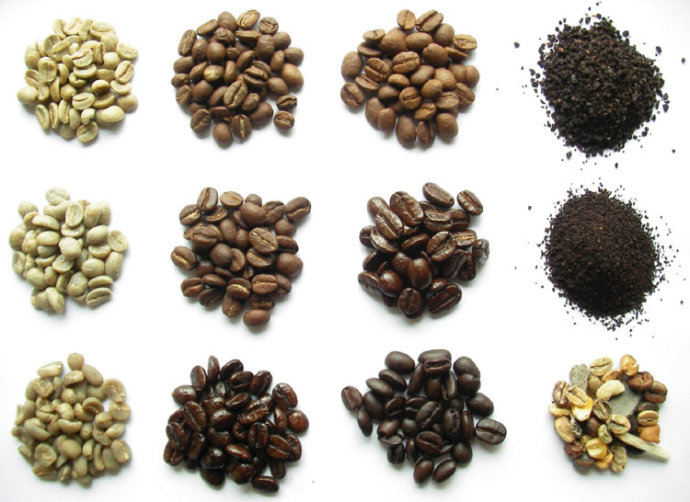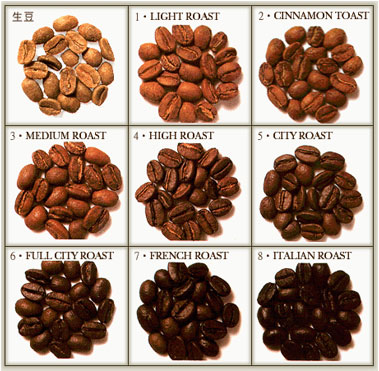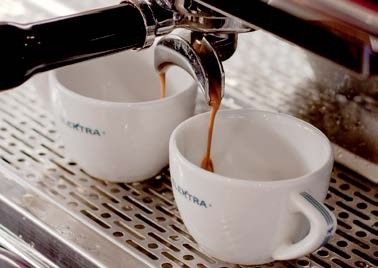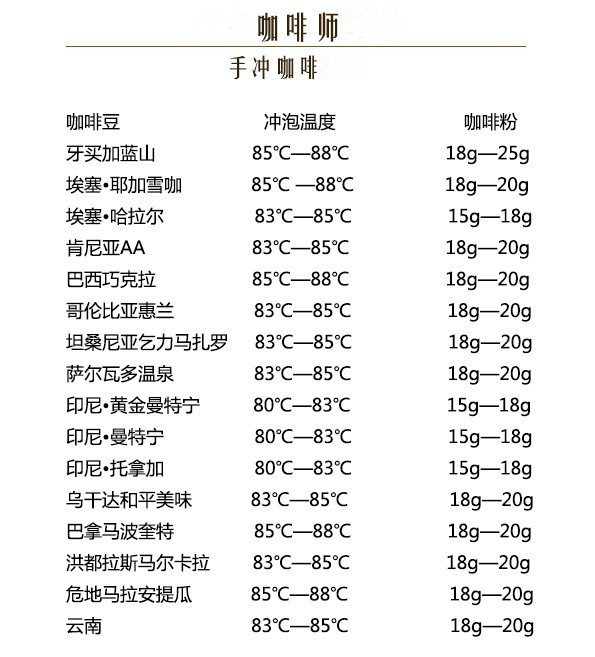A brief description of the difference between roasting time and classification of coffee beans
The so-called coffee roasting (coffee roasting) refers to the process that through heating the raw beans, a series of physical and chemical reactions take place inside and outside of the coffee beans, and in this process, the sour, bitter, sweet and other flavors of the coffee are formed, forming mellowness and hue, and transforming the raw beans into dark brown beans.
The original beans of coffee rely on professional technology to maximize the flavor of beans. The high heat in the roasting process triggers a series of chemical reactions in coffee beans. Sugar and starch are converted into volatile oils and become the glycol and aroma of coffee.
Coffee roasting is an art. Timing is the key. Baking time affects the color and taste of the final product, so the baking time depends on what kind of coffee you want. The baking time varies depending on the type of coffee you need:
7 minutes-light roasting; typical American popular coffee.
9 to 11 minutes-moderate baking; this is a deep baking often referred to as "urban baking".
12 to 13 minutes-dark baking; also known as French French roast or Viennese coffee, just like boutique coffee in the Pacific Northwest.
14 minutes-extra thick roasting; also known as espresso roasting (coffee beans are actually starting to smoke, and the sugar inside turns to caramel and starts to burn).


Among the factors affecting the taste of a cup of coffee, raw beans account for 60%, roasting accounts for 30%, and extraction accounts for 10%. Good roasting can maximize the personality of raw beans and minimize the occurrence of defective flavors. on the contrary, improper roasting will completely destroy good beans. As the heating, time, and temperature control in the baking process is very difficult to grasp, baking technology is a very complex technology, so the importance of baking is more prominent.
In fact, there is so much complexity and variability in the baking process that a real baker needs not only theory, but also a lot of experience and perception. Because a variety of small changes in temperature, heat and other small changes in the baking process can change the taste of beans, different beans have different characteristics, and baking is a work of rapid operation in a short time, so bakers are required to master the relevant principles, have a clear grasp of the characteristics of raw beans, and can accurately budget and adjust the baking process in the baking process.
Source: network
Important Notice :
前街咖啡 FrontStreet Coffee has moved to new addredd:
FrontStreet Coffee Address: 315,Donghua East Road,GuangZhou
Tel:020 38364473
- Prev

The biggest reason for determining the quality of espresso is the professionalism of baristas.
Once you have experienced a cup of high-quality espresso, you can no longer accept a cup of inferior espresso! Just as coffee beans are important to the quality of espresso, baristas' knowledge and skills in making espresso are crucial to the quality of espresso. Making espresso does not require any high-tech knowledge, but it is true in the production process
- Next

The knowledge that must be seen in the introduction of baristas will teach you how to become a professional barista.
Mamba coffee Mandeling Brazilian Coffee Manning with Brazil, fragrant and delicious, strong and delicious, is the perfect carbon roasted coffee in coffee Charcoal Roasted Coffee slow-roasted coffee, more rich, glycolic Brazilian coffee Brazilian Coffee neutral coffee, aromatic Yigou mocha coffee Mocha Coffee Origin: Ethiopia
Related
- What is the meaning of lactic acid fermentation with coffee bean treatment?
- How to judge the state of foam by sound?
- How does the latte pull out the unicorn pattern? Come to get for a little trick to improve the flower pull!
- Will flower pulling affect the taste of the latte?
- Do you know the history of coffee?
- The difference between honey treatment and sun washing what is raisin honey treatment?
- What kind of milk can a novice use to make coffee foam to keep the foam longer? The correct method and skills of milking tutorial sharing
- Why do washed coffee beans taste sour? Flavor characteristics of washed Coffee
- Introduction to the skill of how to practice the size and height of water injection around the circle of hand-brewed coffee
- How do beginners practice coffee flower drawing from scratch?

